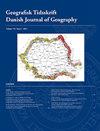城镇居民的网络:喀麦隆的城乡流动和家庭战略
IF 1.1
4区 社会学
Q4 ENVIRONMENTAL STUDIES
Geografisk Tidsskrift-Danish Journal of Geography
Pub Date : 2017-07-03
DOI:10.1080/00167223.2017.1354715
引用次数: 12
摘要
城乡互动是非洲空间动态的重要特征,受到近年来经济、社会和文化转型的影响。学者和决策者的注意力集中在这种流动对农村行为者和经济的影响上。我们的目标是考虑城市家庭的观点,并分析他们如何设法发展和利用他们的“农村联系”。这篇论文是基于在喀麦隆杜阿拉和巴富萨姆进行的深入的定性实地调查。分析了城市居民向农村流动的结构。通过绘制流动性地图,我们展示了与农村地区的联系在城市家庭战略中的作用。我们还说明了一个主要城市和一个快速发展的次要城市与农村地区的联系是如何不同的。本文解决了文献中反复出现的问题之一:城乡联系是否会随着城市化趋势的加剧而长期改变?城乡流动仍然至关重要,有助于创建复杂和动态的网络。集体联系重申了村庄和原籍地区的重要性。流动性是许多城市家庭发展其城市定位和战略的一个关键因素。本文章由计算机程序翻译,如有差异,请以英文原文为准。
Town dwellers in their networks: urban-rural mobility and household strategies in Cameroon
Abstract Urban-rural interactions are important features of spatial dynamics in Africa that have been affected by recent economic, social and cultural transformations. The attention of academics and policy-makers has concentrated on the impact of such mobility on rural actors and economies. Our objective is to consider the point of view of urban households and to analyse how they manage to develop and use their “rural connections”. The paper is based on in-depth qualitative fieldwork conducted in Cameroon, in Douala and Bafoussam. It presents an analysis of the configurations of urban resident mobility to rural regions. By mapping mobility we show the role of linkages with rural areas in urban household strategies. We also illustrate how a major city and a fast-growing secondary one differ in their connections with rural areas. The paper addresses what is one of the recurrent questions in the literature: will urban-rural linkages change in the long-term as the trend towards urbanization intensifies. Urban-rural mobility remains crucial, contributes to creating complex and dynamic networks. Collective connections are reaffirming the importance of the village and the region of origin. Mobility is a key element for many urban households in developing their urban position and strategies.
求助全文
通过发布文献求助,成功后即可免费获取论文全文。
去求助
来源期刊
CiteScore
5.20
自引率
0.00%
发文量
5
期刊介绍:
DJG is an interdisciplinary, international journal that publishes peer reviewed research articles on all aspects of geography. Coverage includes such topics as human geography, physical geography, human-environment interactions, Earth Observation, and Geographical Information Science. DJG also welcomes articles which address geographical perspectives of e.g. environmental studies, development studies, planning, landscape ecology and sustainability science. In addition to full-length papers, DJG publishes research notes. The journal has two annual issues. Authors from all parts of the world working within geography or related fields are invited to publish their research in the journal.

 求助内容:
求助内容: 应助结果提醒方式:
应助结果提醒方式:


